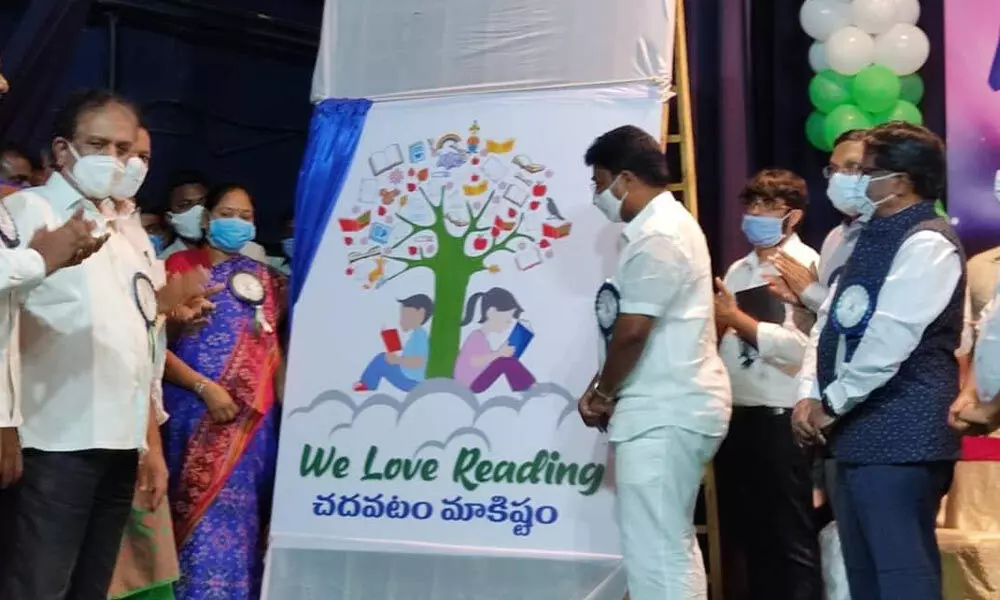Live
- GMR Airports Unveils AI-Powered Digital Twin Platform to Transform Airport Operations
- India poised to become leading maritime player: PM Modi
- Top Causes of Kidney Stones and How to Recognize Silent Symptoms
- India’s renewable energy capacity logs 14.2 pc growth at 213.7 GW
- Winter Session of Odisha Assembly adjourned sine die
- Biden calls Trump's tariff approach 'major mistake'
- After Drama Over Eknath Shinde’s Chief Minister Race, Maharashtra Cabinet Formation Faces New Tensions
- Egyptian FM, Blinken discuss recent developments in Syria
- Iran's supreme leader says Syria's developments result of US-Israeli 'plot'
- Elon Musk to Purchase $100 Million Luxury Mansion Next to Donald Trump's Mar-a-Lago, Report Reveals
Just In
'We Love Reading' campaign to turn students bookwoms


Education Minister Audimulapu Suresh along with Home Minister M Sucharitha and officials launching ‘We Love Reading’ campaign in Guntur on Thursday
- Says the one-year programme is aimed boosting reading skills among students of Classes 2 to 9
- Main activities to be taken up as part of the campaign will be classroom reading, school book bank, community reading centre, reading fests and provision of two library periods, one for Telugu and the one for English
- ASER data show 77.6% of Class 3 students and 52.2% of Class 5 students can’t read Class 2 books
Amaravati: Minister for education Audimulapu Suresh launched the 'We Love Reading' campaign at Venkateswara Vignana mandiram in Guntur here on Thursday.
Speaking on the occasion, the minister said Chief Minister YS Jagan Mohan Reddy laid a special focus on inculcating the habit of reading among the students and thus brought this campaign. 'We Love Reading', the one year reading fluency campaign takes place in four phases — Preparatory, Foundation, Advanced and Valedictory — to improve the reading skills of children from Classes 3 to 9, he said.
Speaking on the occasion, home minister Mekathoti Sucharitha urged the students to inculcate the habit of reading books, newspapers on a day to day basis to gain knowledge and build their own personality. She said that the government prioritised education sector and implemented various welfare schemes like Amma Vodi, Vidya Kanuka, Vasati Deevena, Vidya Deevena and also bringing a new vibe to the government schools through Nadu-Nedu.
The campaign aims at transforming non-readers to readers by cultivating the habit of reading. 'We Love Reading' campaign focuses on developing foundational literacy skills both conceptual and skill-based knowledge among students of Class 3 to 9 and intends to build advanced skills after the foundation. The advanced skills include phonemic awareness, alphabetic principle, reading fluency, vocabulary among others. Awareness will be created on using e-books and digital libraries wherever infrastructure is available.
The main activities to be taken up in this campaign are classroom reading, school book bank, community reading centre, reading fests and most importantly, providing two library periods, one is for Telugu reading and the other is for English. As part of classroom reading, a reading corner with all the available library books and reading cards will be made available in each classroom.
Similarly, with school book banks, where books of all kinds will be collected from teachers, students and even donors, for reading. The programme also has a community reading volunteer, where the headmaster and teachers with the help of ward volunteers and village secretariat staff have to identify volunteers who can contribute their time for school students reading campaign during after school hours and holidays to run the community reading centre. In addition, monthly reading fests will be conducted at the village or school level to perform reading skills by the students and to assess the achievement of learning outcomes of students.
The programme will be monitored continuously at various levels, right from the state level to village level. Apart from the state action plan, the headmasters will be preparing school-wise action plans for effective implementation of the programme falling in line with the action plans of mandal level and village level. The school education department will be designing various reading activities in the reading programme by providing world-class literature and research studies on content and pedagogy, teaching methods, assessment procedures, learning styles of students, teaching-learning material preparation and utilization techniques, lesson plans.
The programme is based on a survey provided by ASER (Annual Status of Education Report) data which says that 77.6 per cent of 3rd standard and 52.2 per cent of 5th standard students are not able to read Class 2 books and speaks about how the reading skills have deteriorated over a period of time. So far, 45,359 schools registered under the Readers Clubs and 72 per cent of these schools have libraries. The existing school libraries and available village libraries will be strengthened and utilised for this initiative.

© 2024 Hyderabad Media House Limited/The Hans India. All rights reserved. Powered by hocalwire.com






